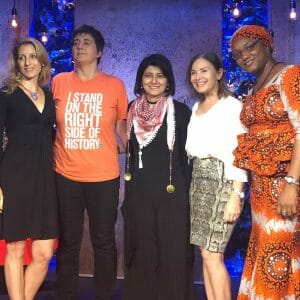The inconvenient consequences of a culture of convenience
Single-use plastics — such as cups with straws, takeout containers and water bottles — are so common in our culture of convenience that we often don’t give them a second
Students put their education to work with sustainable city planning and policy
From low-carbon systems and LEED-certified building construction to water and land conservation techniques, there are many ways to promote and practice sustainability within the community. While it can be easier
Recent Webinar: Learn more about the Central American Locust
To successfully realize our work at the Global Locust Initiative (GLI), we engage globally with collaborators living and working with locusts and grasshoppers locally in their communities. Among our list
The inconvenience of single-use plastics
An ASU Now story titled “The inconvenient consequences of a culture of convenience” was published today. In this article, ASU Center for Biodiversity Outcomes Associate Director of Biodiversity Valuation and
Biodiversity conservation needs new partnerships
If conservation science is going to save the myriad species under threat in the world today, it’s going to have to go about it more efficiently, according to a paper

Female entrepreneurs strengthen sustainable businesses through WE Empower Challenge
Awardees of the inaugural WE Empower UN SDG Challenge — a global business competition for female entrepreneurs who are advancing the United Nations Sustainable Development Goals — recently spent several
Ecosystem-Based Fisheries Management
ASU Center for Biodiversity Outcomes Founding Director Leah Gerber recently co-authored a paper titled “Ecosystem-Based Fisheries Management for Social-Ecological System: Renewing the Focus in the United States with Next Generation
ASU researcher innovates solar energy technology in space
Experts predict that by 2050 we’re going to have global broadband internet satellite networks, in-orbit manufacturing, space tourism, asteroid mining and lunar and Mars bases. More than a gigawatt of
Can all biodiversity be saved?
If not all species can be saved, how do we decide which ones to save? This question is more relevant than ever, as we live in the Anthropocene, a geological
Arizona university researchers collaborate to forecast, track flooded infrastructure
The National Science Foundation has awarded a $1.5 million Smart and Connected Communities grant to a team of researchers at Arizona’s three public universities to develop a network that integrates
CBO welcomes two new postdoctoral fellows
The ASU Center for Biodiversity Outcomes is excited to welcome Danica Shaffer-Smith, the second NatureNet Science Fellow hired in partnership with The Nature Conservancy, and Gwen Iacona who will be
ASU-STRI partnership call for student applications
The ASU-Smithsonian Tropical Research Institute partnership is currently accepting applications from graduate students interested in learning about tropical science in Panama. Students can apply to attend the Tropical Ecology and